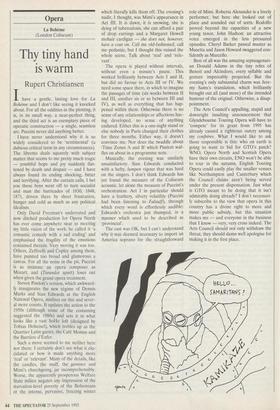Opera
La Boheme (London Coliseum)
Thy tiny hand is warm
Rupert Christiansen
Ihave a gentle, lasting love for La Boheme and I don't like seeing it knocked about. For all the oddities in the plotting, it is, in its small way, a near-perfect thing, and the third act is an exemplary piece of operatic construction — a single, seamless arc. Puccini never did anything better.
I have never understood why it is so widely considered to be 'sentimental' (a dubious critical term in any circumstances). The libretto deals squarely with subject matter that seems to me pretty much tragic — youthful hope and joy suddenly flat- tened by death and despair — and I have always found its ending shocking, bitter and terrifying. After the curtain calls, I bet you those boys went off to turn socialist and man the barricades of 1830, 1848, 1871, driven there by sheer frustration, hunger and cold as much as any political idealism.
Only David Freeman's underrated and now ditched production for Opera North has ever come anywhere near to meeting my little vision of the work: he called it 'a romantic comedy with a sad ending' and emphasised the fragility of the emotions contained therein. Very moving it was too. Others, Zeffirelli and Copley among them, have painted too broad and glamorous a canvas. For all the noise in the pit, Puccini is as intimate an opera composer as Mozart, and (Turandot apart) loses out when given the grand opera treatment.
Steven Pimlott's version, which awkward- ly inaugurates the new regime of Dennis Marks and Sian Edwards at the English National Opera, misfires on this and sever- al more counts. It updates the action to the 1950s (although some of the costuming suggested the 1980s) and sets it in what looks like a vast SoHo loft (designed by Tobias Hoheisel), which trebles up as the Quartier Latin garret, the Café Momus and the Barriere d'Enfer.
Such a move seemed to me neither here nor there: I certainly don't see what it elu- cidated or how it made anything more 'real' or 'relevant'. Many of the details, like the candles, the muff, the gamines and Mimi's churchgoing, jar incomprehensibly. Worse, the apparently prosperous Welfare State milieu negates any impression of the starvation-level poverty of the Bohemians or the intense, pervasive, freezing winter which literally kills them off. The evening's nadir, I thought, was Mimi's appearance in Act III. It is dawn, it is snowing, she is dying of tuberculosis, she can afford a pair of drop earrings and a Margaret Howell mohair cardigan — she does not, however, have a coat on. Call me old-fashioned, call me pedantic, but I thought this ruined the whole scene. Talk about 'real' and 'rele- vant'.
The opera is played without intervals, without even a minute's pause. This worked brilliantly between Acts I and II, but did no favour to Acts III or IV. We need some space there, in which to imagine the passages of time (six weeks between II and III, another six or so between III and IV), as well as everything that has hap- pened within them. Otherwise there is no sense of any relationships or affections hav- ing developed, no sense of anything endured. Either this is a one-night stand or else nobody in Paris changed their clothes for three months. Either way, it doesn't convince me. Nor does the twaddle about 'Time Zones A and B' which Pimlott waf- fles on about in a programme note.
Musically, the evening was similarly unsatisfactory. Sian Edwards conducted with a hefty, lumpen vigour that was hard on the singers. I don't think Edwards has yet found the measure of the Coliseum acoustic, let alone the measure of Puccini's orchestration. Act I in particular should have a feathery, silvery volatility (Puccini had been listening to Falstaff), through which every word is effortlessly audible: Edwards's orchestra just thumped, in a manner which used to be described as 'provincial'.
The cast was OK, but I can't understand why it was deemed necessary to import an America soprano for the straightforward role of Mimi. Roberta Alexander is a lovely performer, but here she looked out of place and sounded out of sorts. Rodolfo proved beyond the capacities of a new young tenor, John Hudson: an attractive voice emerged in the less pressured episodes. Cheryl Barker passed muster as Musetta and Jason Howard swaggered con- fidently as Marcello.
Best of all was the amazing septuagenari- an Donald Adams in the tiny roles of Benoit and Alcindoro, every syllable and gesture impeccably projected. But the evening's only substantial charm was Jere- my Sams's translation, which brilliantly brought out all (and more) of the intended humour of the original. Otherwise, a disap- pointment.
The Arts Council's appalling, stupid and downright insulting announcement that Glyndebourne Touring Opera will have to 'compete' for its grant from 1995 has already caused a righteous outcry among my confreres. What I would like to ask those responsible is this: who on earth is going to want to bid for GTO's patch? WNO, Opera North and Scottish Opera have their own circuits, ENO won't be able to tour in the autumn, English Touring Opera could easily play the smaller venues like Northampton and Canterbury which the Council claims aren't being served under the present dispensation. Just what is GTO meant to be doing that it isn't admirably doing already? I don't necessari- ly subscribe to the view that opera in this country has a divine right to more and more public subsidy, but this situation makes me — and everyone in the business that I know — very, very cross indeed. The Arts Council should not only withdraw the threat, they should damn well apologise for making it in the first place.


























































 Previous page
Previous page